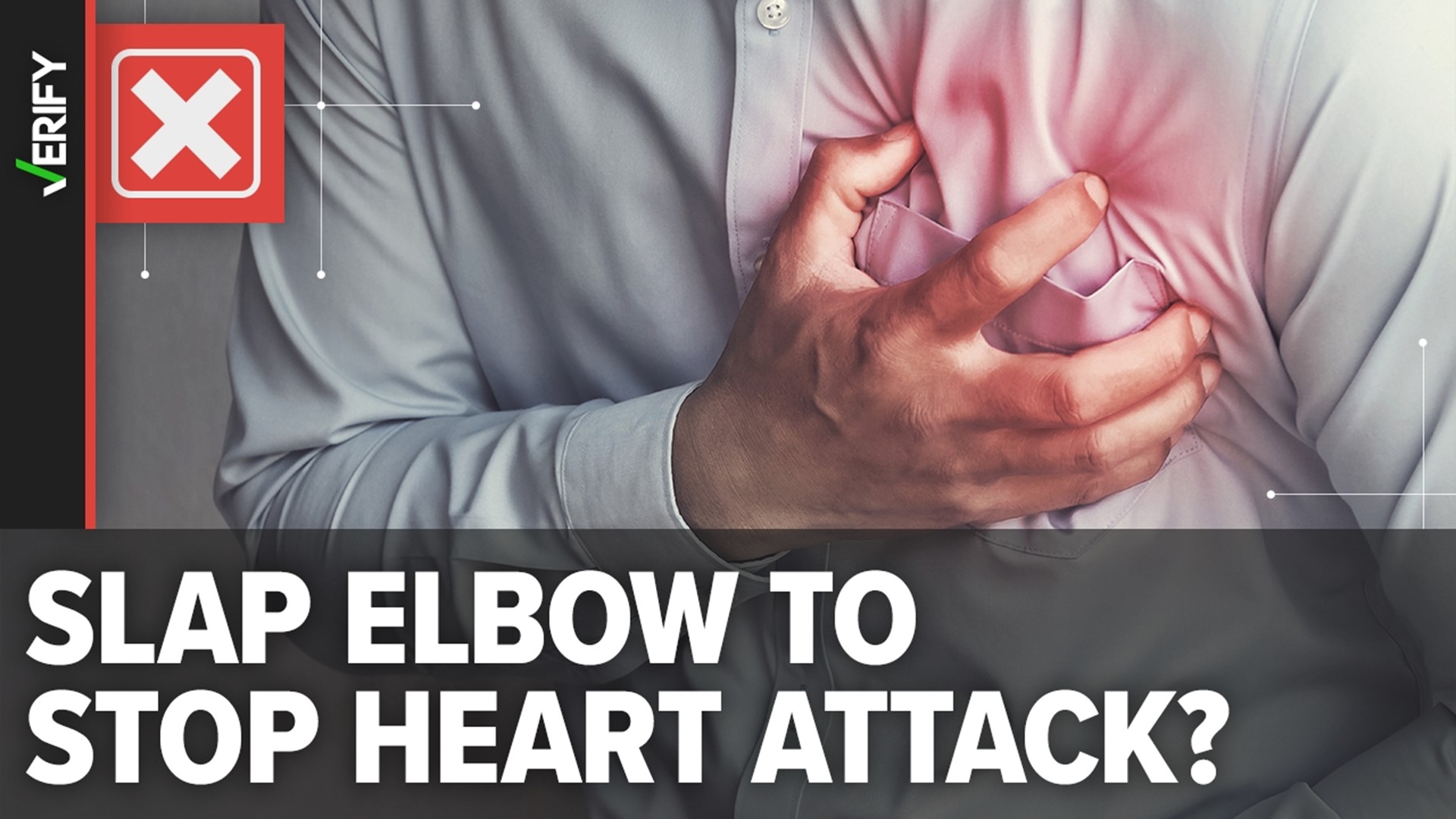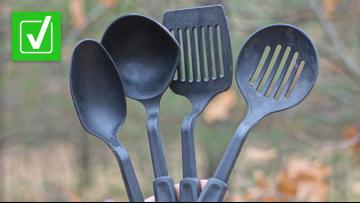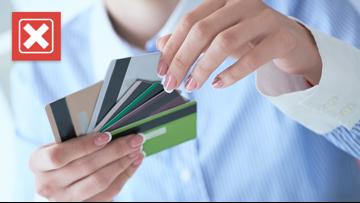February is American Heart Month. It’s a time when the nation raises awareness about heart disease, the leading cause of death in the United States.
Someone has a heart attack every 40 seconds in the U.S., according to the Centers for Disease Control and Prevention. In 2023, two videos that went viral on TikTok claimed slapping a person’s elbow pit — the space between the forearm and upper arm — could prevent or treat a heart attack.
VERIFY reader Gail asked us if there is any truth to these claims.
THE QUESTION
Can slapping the inside of a person’s elbow prevent or treat a heart attack?
THE SOURCES
- American Heart Association
- Centers for Disease Control and Prevention (CDC)
- National Heart, Lung, and Blood Institute (NHLBI)
- Payal Kohli, M.D., associate adjunct professor in the cardiology division at Duke University, associate clinical professor of medicine at the University of Colorado Anschutz and founder of Cherry Creek Heart
- Donald Lloyd-Jones, M.D., chair of preventive medicine at Northwestern Medicine and past president of the American Heart Association
- David Schopfer, M.D., cardiologist in the division of cardiovascular sciences at the National Heart, Lung, and Blood Institute (NHLBI)
THE ANSWER
No, slapping the inside of a person’s elbow can’t prevent or treat a heart attack.
WHAT WE FOUND
Slapping the inside of a person’s elbow cannot prevent or treat a heart attack or heart disease, according to our sources. Medical experts say you should call 911 immediately if you or someone you know is having a heart attack.
“There's no valid scientific evidence that supports that any kind of touching, tapping, squeezing, poking of your elbow, or any body part at all, can stop a heart attack in progress,” said David Schopfer, M.D., a cardiologist at the National Heart, Lung, and Blood Institute (NHLBI).
Payal Kohli, M.D., an associate adjunct professor in the cardiology division at Duke University, agrees.
“There is no scientific evidence or literature to support this and, in fact, what you're doing is actually making the situation worse,” Kohli told VERIFY.
A heart attack happens when a part of the heart muscle doesn’t get enough blood. The more time that passes without treatment to restore blood flow, the greater the damage to the heart muscle, according to the CDC.
Coronary artery disease is the main cause of heart attack, the CDC says. A less common cause is a severe spasm, or sudden contraction, of a coronary artery that can stop blood flow to the heart muscle.
“There is no basis in what we know about coronary artery disease to suggest that tapping or slapping a person’s elbow is an effective way to treat or prevent a heart attack,” said Donald Lloyd-Jones, M.D., chair of preventive medicine at Northwestern Medicine.
“People should talk to their doctor about their risk for heart attack and the best ways to prevent it, not depend on information like this from the internet,” Lloyd-Jones added.
The American Heart Association says symptoms of a heart attack can include:
- Chest pain or discomfort
- Discomfort in other areas of the upper body (one or both arms, the back, neck, jaw or stomach)
- Shortness of breath
- Other signs may include breaking out in a cold sweat, nausea or lightheadedness
You should call 911 immediately if you notice symptoms of a heart attack in you or someone else. The American Heart Association says calling 911 is “almost always the fastest way to get lifesaving treatment” from an experienced emergency medical services (EMS) team who can arrange rapid transport to the emergency room.
Schopfer says you should never drive yourself or someone else who is experiencing heart attack symptoms to the hospital, “even if you think you can get them there quickly” because you’ll receive better treatment “than if you just show up into triage and the emergency room complaining of chest pain.”
“It’s better to just have paramedics come because they can start treatment immediately when they get there,” said Schopfer. “The paramedics can coordinate with the hospital so the hospital is also prepared when you get there.”
He also says that people experiencing a heart attack can take uncoated aspirin while waiting for paramedics to arrive because it acts as a blood thinner and can prevent blood clots from forming, especially for individuals with heart disease or those who have had a heart attack in the past.
VERIFY was unable to determine where the elbow slapping method originally came from. Kohli says “the only possible scientific mechanism of elbow slapping could be if you slap or stimulate the blood vessel, you could release a chemical from the wall of the blood vessel called nitric oxide, which can dilate the arteries and the vein.”
“But that’s really not advised, especially in an emergency situation and definitely not on a long-term basis because you’re actually traumatizing the wall of the blood vessel by slapping your elbow,” Kohli said.
Kohli recommends regular exercise instead of slapping the inside of your elbow or another person’s elbow to prevent or treat a heart attack.
“Take a little walk or do a little jogging — that's much more likely to pay off with respect to heart health,” Kohli said.
The CDC and NHLBI both share tips on how to improve your heart health and prevent heart disease on their websites. The American Heart Association and Kohli also recommend following “Life’s Essential 8,” which are the key measures for improving and maintaining cardiovascular health.
“We know that healthy diet, physical activity, healthy sleep, avoiding cigarette smoking, and maintaining a healthy weight, blood pressure, cholesterol profile, and blood sugar are clearly the best ways to prevent heart attack,” said Lloyd-Jones.












